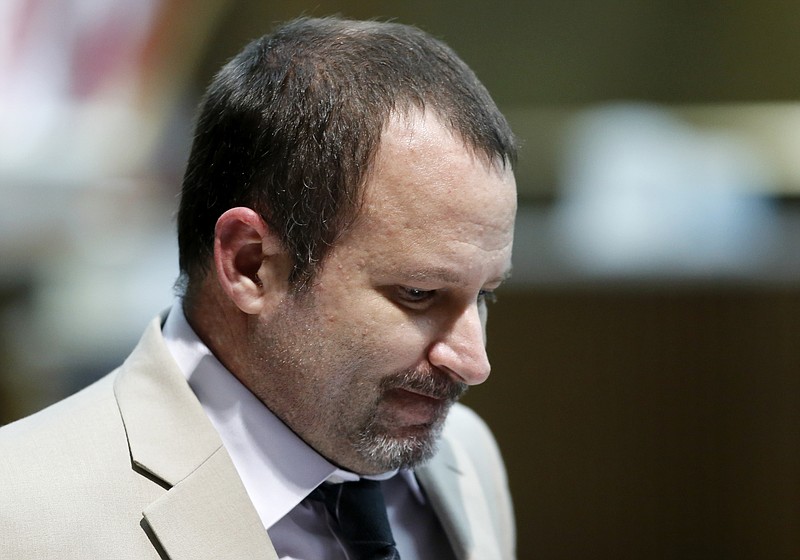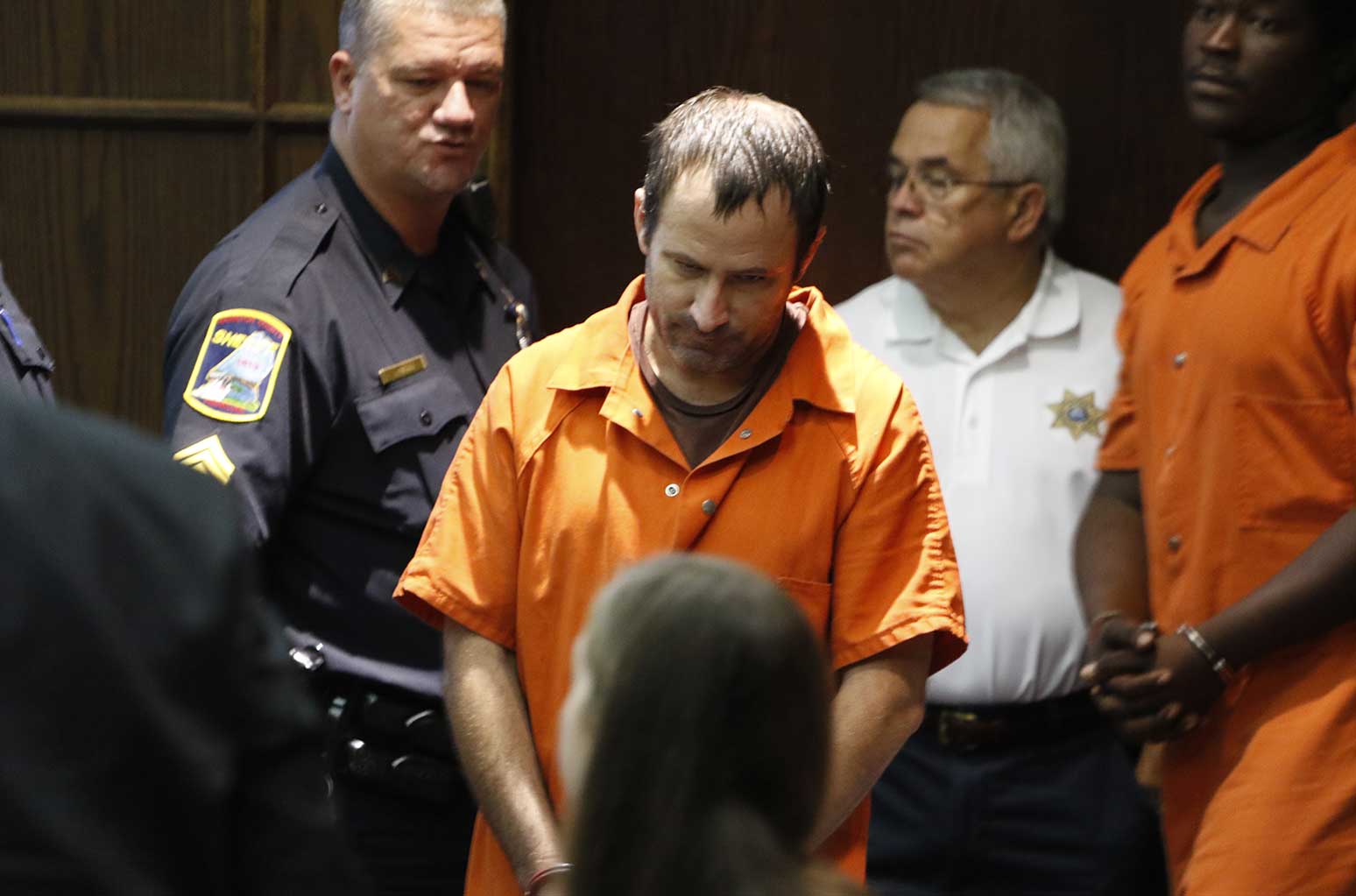Photo Gallery
High School Volleyball Championships
Nettleton takes on Siloam Springs and Marion battles Van Buren during the 5A, and 6A class Volleyball Championships at Bentonville High Saturday October 30th. Bentonville took on Fayetteville for the 7A Championship.
pic.twitter.com/NqyIsNYmCF— Zack Peterson (@zackpeterson918) January 25, 2018Tweets by @zackpeterson918
UPDATE: The state has rested its case. Prosecutors say they called their last witness yesterday, and that was a TBI agent who reviewed Ben Brewer's toxicology report.
___
ORIGINAL STORY: After introducing the emotional testimony of crash survivors Monday, prosecutors showed jurors three pieces of material evidence that supported their argument against Ben Brewer: a drug recognition exam that suggested he was on a stimulant, a Tennessee Highway patrolman who said the trucker's brakes worked fine and a toxicology report from a state lab showing methamphetamine in his system.
It's unclear what prosecutors plan to present Wednesday when Brewer's trial continues at 9 a.m. before Hamilton County Criminal Court Judge Don Poole. They could call Brewer's fiancé, Charity Pennington, who was in the semitractor-trailer with Brewer when he smashed into slowed traffic on Interstate 75 near Ooltewah traveling roughly 80 mph on June 25, 2015. Prosecutors say Brewer never hit the brakes and was impaired at the time.
But Brewer's public defenders, who have fought the prosecution every step of the way, continued to argue Tuesday that intoxication did not cause the crash. Brewer may have had meth in his system, but was he impaired at that moment behind the wheel? No testifying on-scene officers seemed to think he was intoxicated, because they didn't document it, attorney Erinn O'Leary argued Monday.
But that's what prosecutors have to prove if they want convictions on Brewer's six counts of vehicular homicide by way of intoxication. The Kentucky driver also faces four counts of reckless aggravated assault and three driving charges.
Defense attorneys primarily sought to undermine the state's drug recognition evaluation, a 12-step program that officers use to predict what type of substance a suspect ingested. Attorney Jay Underwood, who has previously called the evaluation "voodoo science," said Tuesday that Brewer wasn't exhibiting any of the symptoms that indicate a person is on a stimulant. That's what officer Brian Hickman guessed was in Brewer's system, in addition to depressants, which never popped up during a blood test.
Brewer wasn't suffering from loss of appetite, insomnia, abnormal muscle tone or high body temperature, and he wasn't hyperactive or extra chatty, Underwood said. All of those symptoms belonged to someone suspected of taking a stimulant, he said, not his client. Plus, Underwood said, Brewer was likely experiencing stress or shock from the crash, which killed six and injured several more. That's why he had high blood pressure that threw off the evaluation.
"You're obviously not a doctor," he said to Hickman. "You don't know what those base things for him are."
Next, defenders went after Brewer's vehicle. Investigators couldn't fully check the 18-wheeler for defects because of the crash, O'Leary said, and Brewer had some brake work done shortly before the June 25, 2015, crash.
District Attorney General Neal Pinkston had just one follow-up question for his witness, John Harmon, of the Tennessee Highway Patrol.
"The brakes were working fine, weren't they?" Pinkston asked.
Harmon said they were.
One of the bigger grapples Tuesday involved a toxicology expert from the Tennessee Bureau of Investigation who tested Brewer's blood.
Prosecutors wanted agent Melinda Quinn to discuss the impact meth has on everyday functions, like driving, and how some people can appear "sedate" as their body metabolizes the drug out of their system. That would damage the argument defenders made earlier about Brewer not showing hyperactive signs of a meth user. But in addition to that, attorney Mike Little said, Quinn couldn't say if or when Brewer ingested meth in relation to the crash.
"You don't even know if he's high," Little said.
After a special hearing outside of the jury's presence, Judge Poole allowed Quinn to testify.
With jurors present, Little repeated his argument: Quinn couldn't give any specifics. Quinn agreed and said she believes a toxicologist should never say a person is under the influence based on their report alone. There were two other factors to evaluate: What caused the officer to be in contact with this person? And what the drug recognition officer observe?
Contact staff writer Zack Peterson at zpeterson@timesfreepress.com or 423-757-6347. Follow him on Twitter @zackpeterson918.
Timeline:
June 25, 2015: Brewer crashes into slowed traffic on Interstate 75, is detained on scene and given a drug test and is allowed to return to Kentucky. Six die and several others are injured.Aug. 3, 2015: A Hamilton County grand jury indicts Brewer on charges of vehicular homicide, reckless aggravated assault, driving under the influence of a narcotic, speeding and violation of motor carrier regulations. He is extradited to Tennessee shortly thereafter.September 2015: Brewer makes his first court appearance and receives a court-appointed defense attorney. Crash victims have begun filing personal injury lawsuits.October 2016: As the case winds through court, the National Transportation Safety Board releases its final report and concludes driver fatigue and drug use led to the nine-vehicle crash.February 2017: Brewer’s attorneys ask to suppress several pieces of evidence, including his blood test, saying officers detained him on scene without a warrant.May 2017: Judge Don Poole rules against that request but says jurors don’t need to hear about some of the miscellaneous items in Brewer’s tractor-trailer. Attorneys also agree not to mention Brewer’s prior employment or drug history.June 12, 2017: Attorneys travel to Nashville to pick an out-of-town jury, agreeing that extensive media coverage has made Chattanoogans too biased to hear the case.June 2017: Right before trial on June 17, defense attorneys learn that a federal lab in Oklahoma also tested Brewer’s blood and found a different level of methamphetamine than the Tennessee Bureau of Investigation reported back in 2015.June 19, 2017: Judge Poole cancels the trial and sets a new date on Sept. 25 to give defense attorneys more time to investigate the second test.September 2017: Brewer’s defense say government attorneys want to block their effort to call a federal employee to the witness stand to explain the second test. They reach an agreement to depose the employee beforehand, but Poole has to cancel the Sept. 25 date.October 2017: The judge resets the trial date to Jan. 22 and says attorneys will pick a new jury from Nashville.Jan. 18, 2018: Attorneys pick a 16-person jury, with four alternates, after a day of questioning.Jan. 22, 2018: Proceedings started Monday in Hamilton County Criminal Court Division III. Jurors will be sequestered throughout the week to avoid outside communication.


